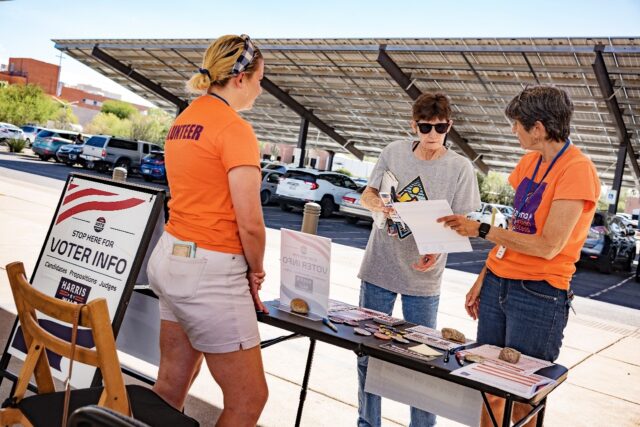As their race for the US presidency comes down to the wire, each major candidate has leaned heavily on a favorite theme — abortion rights for Democrat Kamala Harris and border security for Republican Donald Trump.
In Arizona, their ideological duel has reached a white-hot peak, with both topics the subject of fiercely debated ballot referendums.
And in this key southwestern state — where the billionaire Trump lost to President Joe Biden in 2020 by a tiny margin of about 10,500 votes — every ballot truly will count.
In the mid-sized city of Tucson, hundreds of volunteers in orange T-shirts were going door-to-door to try to persuade voters to back a ballot measure to inscribe abortion rights in the state constitution — and, while they’re at it, to vote for Vice President Harris.
To Grace Ireland, a 26-year-old activist, the abortion restrictions imposed by several Republican-controlled states amount to “a public health crisis that Donald Trump and the Republicans have created.”
She added, “Democrats and Kamala Harris are trying to push us forward and protect women’s health care and protect our democracy and protect all people.”
Since 2022, when the US Supreme Court ended the constitutional protection of federal abortion rights, Ireland, a registered nurse, has worked in several states where abortion is banned or severely limited.
Those restrictions have had sometimes disastrous consequences for women having problem pregnancies or carrying nonviable fetuses when doctors refuse to treat them.
“Women are going septic and dying because they cannot receive the care that they need,” she told AFP.
‘Abortion is murder’
As Ireland carries her message to potential voters, she noted, particularly to young people who may be less likely to vote, that it was Donald Trump who appointed the three justices who tipped the Supreme Court against abortion rights.
“It’s important to reiterate that Donald Trump and these abortion bans are one and the same,” Ireland said.
But in Tucson there is little unanimity among young voters.
“I do think that abortion is murder,” said Pedro Lopez, a 20-year-old college student.
“There are cases of incest or rape” that merit exceptions, he conceded, “but that’s very small.”
He also worries about the flow of undocumented migrants that have entered the country from Mexico during the Biden-Harris administration.
“People that are entering the United States illegally… should be sent back to where they came from,” he said.
“My grandparents migrated from Mexico to the United States, and they did it the right way.”
So he plans not only to vote for Trump, but to back the proposal to let local law enforcement detain, arrest and prosecute anyone suspected of having entered the country illegally — powers normally reserved to the border police who work for the federal government.
“I know people that work for the Border Patrol, and they’re really upset because this current administration has really tied their hands up. They’re not really able to do anything,” Lopez said.
Mixed impact
The major political parties see the competing referendums as offering an opportunity to mobilize more people to vote — on ballot questions at the very heart of the two presidential campaigns.
But the referendums may not have the clear impact on the race for the White House that activists hope.
Polls show Trump and Harris running neck-and-neck in Arizona, with the Republican holding a very narrow lead.
Both ballot questions, meantime, have drawn strong support and both appear likely to pass.
So the abortion issue may not be “helping Democrats in the way that they would hope,” said Jenny Brian, a professor of bioethics at Arizona State University.
Many Republican women will vote both to protect abortion rights and to bring Trump back to the White House, Brian said.
Though abortion is sometimes framed as a Democrat vs. Republican issue, the Republican Party includes “a broad spectrum of views on the topic,” an issue that also raises conservatives’ concerns about “government interference,” she added.
The same dynamic applies to immigration, with the tougher language on the Arizona ballot question finding support not just among Trump Republicans but also “moderates and even many Democrats,” said John Kavanagh, a Republican and an Arizona state senator.
The 74-year-old Kavanagh is unimpressed by Harris’s recent toughening on migration, specifically her promise to maintain the partial closing of the border Biden ordered in recent months.
The vice president, Kavanagh said, is “running away faster from her open-border policy than an illegal immigrant that runs away from the Border Patrol.”

COMMENTS
Please let us know if you're having issues with commenting.